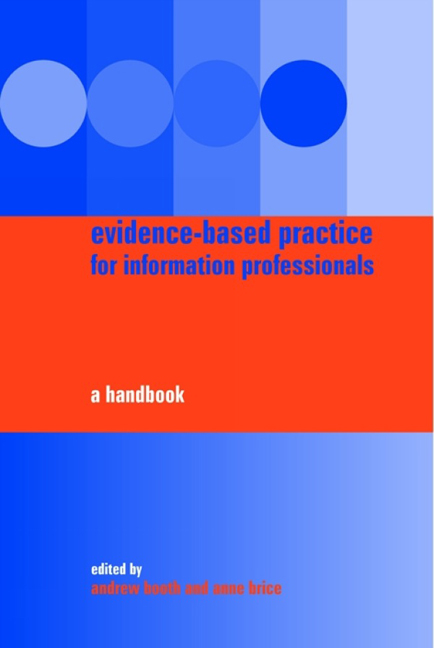Book contents
- Frontmatter
- Contents
- Foreword
- Editors and contributors
- Part 1 The context for evidence-based information practice
- Part 2 Skills and resources for evidence-based information practice
- 6 Formulating answerable questions
- 7 Identifying sources of evidence
- 8 Searching the library and information science literature
- 9 Appraising the evidence
- 10 Applying evidence to your everyday practice
- 11 Evaluating your performance
- 12 Disseminating the lessons of evidence-based practice
- Part 3 Using the evidence base in practice
- Index
12 - Disseminating the lessons of evidence-based practice
from Part 2 - Skills and resources for evidence-based information practice
Published online by Cambridge University Press: 08 June 2018
- Frontmatter
- Contents
- Foreword
- Editors and contributors
- Part 1 The context for evidence-based information practice
- Part 2 Skills and resources for evidence-based information practice
- 6 Formulating answerable questions
- 7 Identifying sources of evidence
- 8 Searching the library and information science literature
- 9 Appraising the evidence
- 10 Applying evidence to your everyday practice
- 11 Evaluating your performance
- 12 Disseminating the lessons of evidence-based practice
- Part 3 Using the evidence base in practice
- Index
Summary
Introduction
Dissemination of research results is vital to the progress of the profession as well as helping to improve practice. It involves not only making your research available, but also ensuring that it is accessible to others and presented in a manner that is easy to understand. In addition, it is important to use a variety of techniques for delivering information in order to provide evidence (or to conduct research where no data are available) for what we do as librarians and to help others understand how we define our role.
In this chapter, we explore the evidence for dissemination and the different methods by which research and knowledge can be circulated. We also provide an overview of how distribution is used by librarians and investigate innovative ways to make your research known. Two types of disseminators, those who conduct research and those who use research findings in their practice, are examined throughout the chapter.
Scenario
As a special librarian, you work with a business research group consisting of a statistician, a research assistant and an MBA. Your role includes conducting environmental scans, facilitating access to online resources and performing comprehensive literature searches. You are also being asked to order documents for employees and other time-consuming tasks which could be done by other staff. You report to the vice president of the organization, who understands little about your role, yet she speaks on your behalf at board meetings. Since you see your boss infrequently, you prepare carefully for your meetings. You wish to communicate your needs and wants better, using evidence. You also want to find effective ways to get vital information to your supervisor. As a solo librarian, you also worry that you are isolated from other librarians and want to find ways to keep up with issues of relevance to your profession while at the same time gaining the support of your colleagues.
Effective dissemination
Dissemination continues to be a hot topic in recent literature. In order to be effective, research needs to be user-friendly, that is, understandable by those to whom we report, as well as to our colleagues. Many libraries are run by non-librarians and many librarians report to a person in another discipline who may not clearly understand their role and function within the organization.
- Type
- Chapter
- Information
- Evidence-based Practice for Information ProfessionalsA Handbook, pp. 138 - 143Publisher: FacetPrint publication year: 2004



